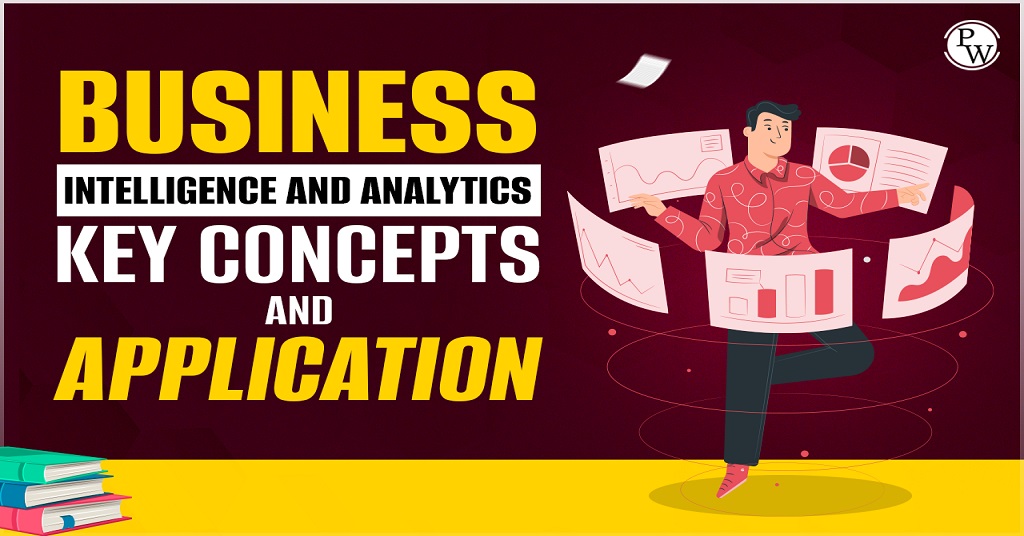Business Intelligence and Analytics: As more companies strive to increase efficiency and remain competitive in the ever-evolving business landscape, having a keen understanding of essential concepts surrounding Business Intelligence and Analytics is critical.
Businesses can create valuable insights integral to any organization’s success by analyzing vast quantities of structured and unstructured data.
To equip a company with actionable solutions based on these data-driven perspectives, determining critical Business Intelligence and Analytics components such as metrics selection processes, analytical techniques applicable across industries, and methodologies for vendor deployment – all while leveraging organizational goals into software models; each process acts as the building blocks towards successful development within a given enterprise setting or network environment.
In this blog post, we will explore these essential concepts and provide suggested implementation strategies. Mastering Full Stack Data Analytics From PW provides an ideal platform to learn these concepts through diverse real-world case studies.
By mastering how to collect, transform, store, analyze, and visualize data with full-stack analytics tools, managers and executives can make quick strategic decisions while increasing their ROI by harnessing all the available data sources. So, take the plunge today and become a more confident data analyst!
What is Business Intelligence and Analytics?
Business Intelligence (BI) aims to use data insights for individual business decisions. On the other hand, BI and Big Data analytics focus on handling data to address more extensive business issues. There are key distinctions between the two. Big Data deals with larger, less specific, often raw data sets, both structured and unstructured.
These require specialized tools for analysis and separate storage like a data warehouse. Today, such data comes from large-scale devices and user activities, influenced by edge computing and the Internet of Things (IoT) in a mobile and cloud-driven world.
Open-source tools help extract value from vast data pools. However, despite their differences, BI and Big Data share a common goal: using data to enhance business objectives, gain insights, and gain a competitive edge.
Business Intelligence (BI) encompasses tools and processes aiding companies in managing data from collection to reporting. This helps organizations discover vital trends and insights for strategic decisions and sustainable growth.
All companies, regardless of size, gather customer demographics, sales, production volumes, and more data. This data often needs to be explored, while decisions rely on intuition or experience, a subjective and error-prone practice.
BI technologies offer real-time, historical, and predictive views of structured data across departments. They empower informed decisions based on data, improving organizational performance.
They provide user-friendly access to advanced analytical technologies like data warehouses and visualization, generating actionable corporate insights.
AI, a vital component of BI, excels in pattern recognition, elevating organizational performance. BI’s self-service nature enables technical and non-technical users to explore data effortlessly. Automation simplifies data collection and monitoring, while interactive graphs and charts visualize critical insights for better understanding.
This user-friendliness cultivates an analytical culture across all stakeholders, which is pivotal for successful BI implementation. Understanding and executing various BI processes correctly is crucial for a successful BI implementation, making business intelligence concepts essential.
These concepts manifest through intuitive, interactive tools and dashboards—a centralized space facilitating easy data exploration, crucial for informed decision-making.
Also read: Comparing Data Analytics Software: Choose Wisely
Business Intelligence and Analytics: Key Concepts
Business Intelligence and Analytics are powerful tools that help organizations transform raw data into actionable insights for informed decision-making. Let’s delve into the key concepts that define this transformative field.
- Data Analysis: Data Analysis is the cornerstone of BI and Analytics. It involves examining, cleaning, transforming, and interpreting data to discover meaningful insights. Analysts identify patterns and trends critical for decision-making through various statistical and analytical techniques.
- Data Visualization: Data Visualization is the graphical representation of data to present information more understandably and insightfully. Charts, graphs, maps, and other visual elements help convey complex data patterns, making it easier for users to comprehend.
- Data Mining: Data Mining examines large datasets to identify patterns, anomalies, and correlations. It utilizes machine learning, statistics, and database systems techniques to unearth valuable insights that might not be apparent initially.
- Predictive Analytics: Predictive Analytics involves using statistical algorithms and machine learning techniques to forecast future outcomes based on historical data. It helps organizations anticipate trends and make proactive decisions.
- Machine Learning in BI: Machine Learning involves the development of algorithms that enable computer systems to learn and improve from experience without being explicitly programmed. In the context of BI, it’s used for predictive modeling, clustering, and other advanced analytics.
- Big Data Analytics: Big Data Analytics deals with processing and analyzing massive volumes of data, often in petabytes or exabytes. It encompasses various tools and methodologies to extract valuable insights from this vast and diverse data.
- Dashboard and Reporting: Dashboards and Reporting provide a visual snapshot of an organization’s performance. Dashboards usually display real-time data, while reports offer more in-depth and structured information. Both aid in monitoring key performance indicators (KPIs) and trends.
- Descriptive Analytics: Descriptive Analytics deals with analyzing historical data to understand what has happened in the past. It forms the foundation for advanced analytics by providing context and insights into historical trends.
- ETL (Extract, Transform, Load): ETL is a crucial data warehousing and analytics process. It involves extracting data from various sources, transforming it into a usable format, and loading it into a data warehouse for analysis.
Also read: Choosing the Right Data Analytics Platform for Your Business
Business Intelligence and Analytics: Applications
Business Intelligence and Analytics have revolutionized decision-making processes across various industries. Here, we explore the diverse applications of BI and Analytics that are transforming the business landscape.
- Financial Analysis: BI and Analytics provide real-time insights into financial data, enabling better financial planning, budgeting, forecasting, and risk management. Financial institutions use analytics to detect fraud and make informed investment decisions.
- Sales and Marketing Optimization: BI tools analyze sales trends, customer behaviors, and market dynamics to optimize marketing strategies. It helps in customer segmentation, product positioning, and assessing campaign effectiveness, enhancing overall sales performance.
- Operational Efficiency: BI applications streamline operations by analyzing internal processes and identifying areas for improvement. Organizations achieve increased productivity and cost savings by optimizing workflows and resource allocation.
- Customer Relationship Management (CRM): BI in CRM helps businesses understand customer preferences, feedback, and purchase history. This information aids in providing personalized experiences, improving customer satisfaction, and fostering long-term relationships.
- Supply Chain and Inventory Management: BI and Analytics optimize supply chain operations by providing real-time visibility into inventory levels, demand forecasts, and supplier performance. This ensures efficient inventory management and on-time deliveries.
- Human Resources Management: HR departments use BI to enhance talent acquisition, employee engagement, and performance evaluation. It helps identify skill gaps, optimize recruitment processes, and improve employee satisfaction and retention.
- Healthcare and Medical Research: In healthcare, BI and Analytics are crucial for analyzing patient data, medical research, and resource allocation. It supports medical professionals in making informed decisions, improving patient care, and advancing medical research.
- E-commerce and Retail: E-commerce platforms leverage BI to analyze customer shopping behaviors, preferences, and purchase patterns. This analysis helps in personalized marketing, product recommendations, and inventory management.
- Predictive Maintenance: Industries like manufacturing and transportation use BI to predict when machinery and equipment need maintenance. This proactive approach reduces downtime, improves asset lifespan, and enhances operational efficiency.
- Smart Decision-Making: Overall, BI and Analytics empower organizations to make data-driven, strategic decisions. By harnessing the power of data, businesses can stay agile, adapt to market changes, and gain a competitive edge.
Business Intelligence and Analytics Solutions: Why Are These Concepts So Important Today?
Business Intelligence (BI) and Analytics Solutions have become integral tools for modern businesses, providing invaluable insights and aiding informed decision-making. Here’s why these concepts hold paramount importance today:
- Data-Driven Decision Making: BI and Analytics solutions empower businesses to base decisions on factual data rather than intuition. Analyzing accurate and up-to-date information ensures that decisions align with business objectives and market realities.
- Competitive Edge: In a fiercely competitive business landscape, gaining a competitive edge is crucial. BI and Analytics help identify market trends, consumer preferences, and competitor strategies, enabling businesses to innovate and stay ahead of the curve.
- Improved Operational Efficiency: By analyzing operational data, businesses can streamline processes, optimize resource allocation, and eliminate bottlenecks. This efficiency leads to cost savings, improved productivity, and enhanced customer satisfaction.
- Enhanced Customer Experience: Understanding customer behaviors and preferences through BI and Analytics allows businesses to tailor products, services, and interactions. This personalized approach enhances customer satisfaction and fosters customer loyalty.
- Risk Mitigation: BI and Analytics enable organizations to identify and assess potential risks. Businesses can develop risk mitigation strategies and safeguard operations against unforeseen challenges by analyzing historical data and market trends.
- Real-Time Insights: Today’s business environment requires timely decision-making. BI solutions provide real-time data and insights, allowing businesses to respond quickly to market changes and make informed choices.
- Adapting to Market Dynamics: Markets evolve rapidly, influenced by various factors. BI and Analytics help in monitoring market shifts, consumer behaviors, and economic trends, enabling businesses to adapt their strategies accordingly and stay relevant.
- Efficient Resource Allocation: With BI tools, businesses can accurately allocate resources, workforce, finances, or time. This ensures that resources are utilized optimally, reducing wastage and maximizing return on investment (ROI).
- Compliance and Governance: BI and Analytics assist organizations in adhering to regulatory compliance and governance requirements. By tracking and reporting on compliance measures, businesses avoid penalties and maintain ethical practices.
- Innovation and Growth: BI fuels innovation by providing insights into emerging trends and growth areas. This data-driven innovation helps businesses expand into new markets, launch innovative products, and explore untapped opportunities.
In summary, BI and Analytics Solutions are vital tools for modern businesses. They help turn raw data into actionable insights, aiding in efficient decision-making, improving operations, and fostering growth and sustainability in an ever-evolving business landscape.
Taking PW’s Mastering Full Stack Data Analytics course is undoubtedly the best way for businesses to gain the skills and knowledge needed today to succeed in this modern analytical landscape. It provides a full immersion into professional industry practice that equips you to tackle all modern challenges in ever-evolving fields such as data science, analytics, and decision-making across all verticals. Learn how to master big data technologies from experts in the field today!
Also read: Discover the Best Data Analytics Courses: Your Path to Success
Business Intelligence and Analytics: Why Choose PhysicsWallah Course?
Choosing the PhysicsWallah course for Business Intelligence and Analytics can be a smart decision for several reasons:
- Expertise and Experience: PhysicsWallah offers courses designed and taught by Business Intelligence and Analytics experts. Their experienced faculty can guide you effectively through the learning process.
- Comprehensive Curriculum: The course will likely cover many topics, ensuring you gain a holistic understanding of Business Intelligence and Analytics. From data analysis to visualization techniques, you can expect a well-rounded curriculum.
- Hands-on Learning: PhysicsWallah often emphasizes practical applications, providing hands-on experience. This interactive approach helps in better comprehension and application of theoretical knowledge.
- Practical Projects: The course may offer opportunities to work on real-world projects, allowing you to apply what you’ve learned in a practical setting. This enhances your problem-solving skills and boosts your portfolio.
- Flexible Learning: PhysicsWallah might offer flexibility regarding learning pace and timing. This can be especially beneficial for working professionals or individuals with busy schedules.
- Support and Community: Being part of the PhysicsWallah course often means access to a supportive community of fellow learners and instructors. This community can provide guidance, support, and a platform for discussion and collaboration.
- Cost-Effective: PhysicsWallah courses could offer value for money, providing quality education at a reasonable cost compared to other available options.
Choosing PhysicsWallah for your Business Intelligence and Analytics course can offer you a blend of expert guidance, a comprehensive curriculum, practical exposure, and a supportive learning environment. It’s essential to consider your specific learning needs and goals before deciding.
Conclusion
In conclusion, Business Intelligence and Analytics are powerful concepts essential to many, if not all, aspects of business. From data acquisition and cleaning to integration with other enterprise systems, there is a lot to learn about BI and analytics, but the ROI is certainly worth it. Investing in proper training and resources can go a long way towards achieving success in these areas.
At PW, we offer an outstanding Mastering Full Stack Data Analytics course that gives students the skills they need to make an impact immediately. Whether you’re a CEO looking for insights into customer behavior or just starting as an aspiring analyst, this program covers you from end to end. Make sure to check out our program today!
Business Intelligence and Analytics: FAQ's
What is the primary goal of Business Intelligence (BI) and Analytics?
The primary goal is to convert raw data into actionable insights, aiding informed decision-making and enhancing business strategies.
How does Analytics differ from Business Intelligence?
Analytics focuses on processing historical data to predict future outcomes, while BI emphasizes analyzing past and present data to understand the current business scenario.
What are the fundamental concepts of Business Intelligence and Analytics?
Key concepts include data analytics, visualization, reporting, mining, predictive modeling, and performance management.
How can businesses apply Business Intelligence and Analytics?
Businesses can use BI and Analytics to optimize operations, improve customer experiences, identify market trends, drive innovation, enhance decision-making, and ensure compliance.
What role does data play in Business Intelligence and Analytics?
Data is the cornerstone; BI and Analytics rely on accurate, organized, and accessible data for generating insights and driving strategic business actions.
What benefits do businesses gain from implementing Business Intelligence and Analytics solutions?
Benefits include improved decision-making, operational efficiency, competitive advantage, customer satisfaction, cost savings, risk mitigation, and agility in responding to market changes.





